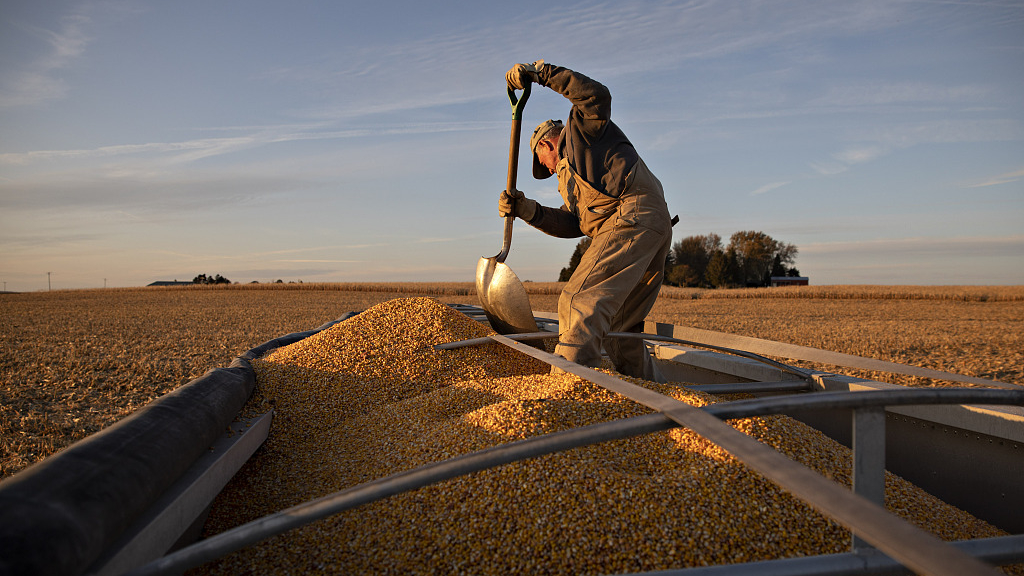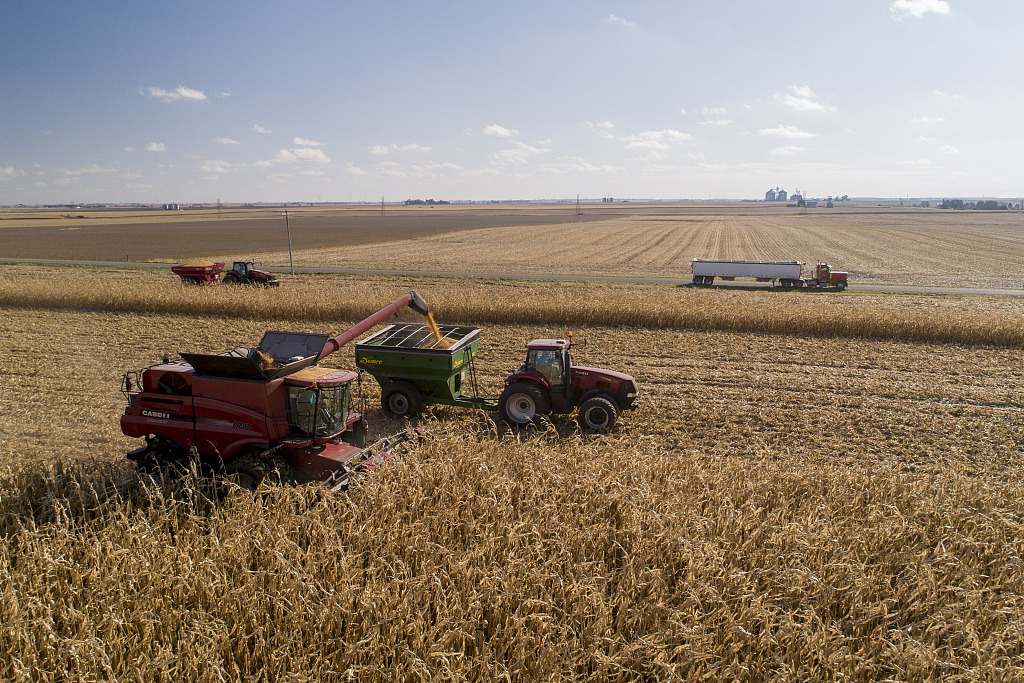
A farmer uses a shovel to move corn inside a semi-trailer in Buda, Illinois, U.S., November 5, 2019. /VCG Photo
A farmer uses a shovel to move corn inside a semi-trailer in Buda, Illinois, U.S., November 5, 2019. /VCG Photo
Editor's note: Tom Fowdy is a British political and international relations analyst and a graduate of Durham and Oxford universities. He writes on topics pertaining to China, the DPRK, Britain and the United States. The article reflects the author's opinions, and not necessarily the views of CGTN.
Last night U.S President Donald Trump tweeted that "our great farmers" will receive a major round of "cash" with "compliments of China tariffs." He further said that "smaller farms and farmers will be big beneficiaries," boasting that Beijing is "starting to buy big again." In reality, the payments are part of an aid package provided by the U.S. government to negate the impact of the trade war on American agriculture, and the money has not come from Beijing but from American taxpayers.
Despite all the clear facts to the contrary, the President was determined to misrepresent the development as some kind of win. U.S. farms have been routed by the trade war which he started. Although talks between the two countries for a "phase-one deal" are ongoing and China has indeed resumed purchases of some farm products, nevertheless the President's protectionist policies continue to be detrimental in the long run. As he opts for tariffs, Beijing has secured access to new agricultural markets which indirectly increases competition for American suppliers. Thus, whilst the President somehow champions this development, in practice the eventual outcome is a question of damage control for him in the long run.
Trump has long claimed to be a champion of farmers and the reason behind this is entirely political. American landowners, given the nature of their profession and lifestyle, are staunchly Republican and detached from the urban-centric sway of the Democrats. Not only that, but many core agricultural areas are situated in key swing states which can decisively make or break an election for Trump, such as Colorado and New Mexico. Hence, he gives them a special focus, repeatedly referring to "our great patriotic farmers" and in his rhetoric, has repeatedly vowed to expand their export markets overseas.
However, the reality is different. This so-called big supporter of American agriculture has thrown U.S. farmers under the bus with a destructive trade war which has saw them getting limited in their biggest overseas market, that is China. The damage has been explicit, farm bankruptcies have surged to the highest since 2011, with agricultural incomes falling dramatically throughout Colorado, Kansas, Nebraska, Oklahoma, Wyoming and Missouri. Farm household spending and capital spending have also declined. In Iowa, farm debt hit an all-time-high of 18.9 billion U.S. dollars.

Corn is loaded into a grain cart from a combine harvester in Buda, Illinois, U.S., November 5, 2019. /VCG Photo
Corn is loaded into a grain cart from a combine harvester in Buda, Illinois, U.S., November 5, 2019. /VCG Photo
Yet the President has been in a state of denial over this outcome, perpetuating falsehoods and misleading statements. The White House has been forced to pay billions in subsidies to cover the agricultural decline, with Trump trying to paint this as "China paying to farmers"- it isn't true, it's American taxpayers and importers who do so. This panic by Trump over a perceived let down of farmers has also led to other false claims in an attempt to show he is "winning" for farmers, including a fabricated notion over the summer that Mexico had "agreed" to buy more U.S. agricultural products, when they had not.
Of course as this situation unfolds, the U.S. is engaged in trade talks with Beijing. Trump wants to close in on what he describes as a "phase-one" trade deal, of which he continues to emphasize big wins for U.S. agriculture with Beijing willing to make commitments accordingly. However, this doesn't guarantee things will go back to how they were. Whilst Trump has slapped tariffs and pursued protectionism as a means of securing trade gains, Beijing has sought to enhance its scope of free trade with other countries and blocs accordingly. For individual Chinese importers and businessmen, this has changed the game.
A year ago China entered into a free trade agreement with the Eurasian Union bloc, which consists of Russia and neighboring countries. This included the field of agriculture. As the agreement entered into force in 2019, soon Chinese food companies instinctively found they had easier and freer access to Russian agricultural products as opposed to American ones. This naturally increased Chinese imports of Russian soybeans as things went downhill with Washington, without any intended malice toward U.S. farmers.
Inevitably, this means that even if China strikes a good deal with the United States, Trump's policies have nevertheless damaged American farmers for the sheer fact they are anti-competitive. As the President literally and figuratively puts up "walls and barriers," U.S. markets are being closed off from other destinations and falling behind as other countries secure free trade elsewhere, limiting opportunities for U.S. farmers.
Thus as a whole, for all his rhetoric, Trump is ruining American agriculture. This is an effect which is going to last beyond the scope of the trade war. No amount of false or misleading statements can change this. It remains to be seen just how much this will cost him politically as 2020 approaches.
(If you want to contribute and have specific expertise, please contact us at opinions@cgtn.com.)